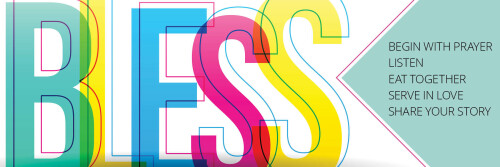The BLESS model for evangelism
By Bill Brown
 Evangelism is a word that often elicits mixed emotions, especially for those of us who are United Methodists. For many, it conjures memories of encounters with judgmental zealots, overly aggressive preachers, and individuals who seem more focused on converting others than on genuine connection. Consequently, it's not surprising that some of us, and particularly millennials, feel hesitant about embracing evangelism. In a society where sensitivity towards diverse beliefs is paramount, the idea of proselytizing can feel uncomfortable and even offensive.
Evangelism is a word that often elicits mixed emotions, especially for those of us who are United Methodists. For many, it conjures memories of encounters with judgmental zealots, overly aggressive preachers, and individuals who seem more focused on converting others than on genuine connection. Consequently, it's not surprising that some of us, and particularly millennials, feel hesitant about embracing evangelism. In a society where sensitivity towards diverse beliefs is paramount, the idea of proselytizing can feel uncomfortable and even offensive.
The reluctance to evangelize within The United Methodist Church stems from a variety of factors, both historical and contemporary. One significant influence is the negative perception associated with evangelism, shaped by encounters with aggressive forms of evangelization. Many have experienced instances where evangelism felt more like coercion than an invitation to explore faith. Furthermore, the changing landscape of religious pluralism has contributed to the reluctance to evangelize. In a multicultural and diverse society, there is a growing awareness and appreciation for different faith traditions. Millennials, in particular, tend to value inclusivity and respect for diverse beliefs. The fear of causing offense or alienating others by imposing one's faith can hinder evangelistic efforts.
However, despite these challenges, there are compelling reasons for United Methodists to reconsider their approach to evangelism. At its core, evangelism is about sharing the transformative power of God's love and grace with others. When done authentically and respectfully, evangelism can foster meaningful connections and inspire individuals to explore their faith journey.
One way to overcome the reluctance to evangelize is by reclaiming the term and reframing its meaning within the United Methodist context. Instead of viewing evangelism as a confrontational or coercive act, it can be understood as an invitation to bless others in our communities.
In their book, Bless: Everyday Ways to Love Your Neighbor and Change the World, authors Dave and Jon Ferguson have developed an innovative approach to evangelism based on the practices of Jesus. I invite you to B.L.E.S.S. those in your community who may not yet have a vital relationship with God. We do this by remembering Jesus’ command to “love your neighbor as yourself.” The BLESS Practices are a series of practical ways you can begin to love and serve your neighbors, friends, co-workers, or relatives who don’t have a relationship with Jesus. Together, the steps form an acrostic for the word "bless."
Begin with prayer: Ask God to show you three to five people in your life who do not know God, and pray for them each day.
Listen: Pay attention to people’s dreams and pain. Listen for evidence of God’s work in their lives.
Eat together: Share meals together. There is an epidemic of aloneness and invisibility in our world, and time over a shared meal or cup of coffee is remarkably connective and a simple way to be part of overcoming it.
Serve in love: Be attentive to opportunities God provides you to care for people and attend to their needs without superiority or devaluing their agency.
Share your story: Once you build a relationship and earn trust, wait for the Holy Spirit to make a way for you to share the story of how Jesus is transforming your life and the world.
If you'd like to talk more about evangelism, please contact the Rev. Bill Brown, director of Innovative Evangelism.

Bill and Jon, this is "spot on." Following COVID and the disaffiliation of over 30% of our churches and the loss of families and individuals who were in a minority when congregational votes were taken about disaffiliation, our local church attendance is frighteningly low. Thousands of our churches have very few new members being received. The present membership is much older than the U.S. population. In 1989 I developed a program called "Vision 2000" which challenged members to identify and adopt as a calendar year goal of bringing to their faith community a Friend, a Relative, an Acquaintance, and a Neighbor who were in no church. "Church Growth" was called a "numbers game" and " gimmickry." It was somewhat shallow and too focused on institutional membership. Your "BLESS" is more akin to Wesley's class meetings. With the near loss of Sunday School, your philosophy has great promise if it were to "go viral."
Blessings!
Don Haynes, retired clergy, Western North Carolina Conference
This concept is also shared by BlessEveryHome.com, a wonderful free resource to pray for your neighbors and track your interactions.